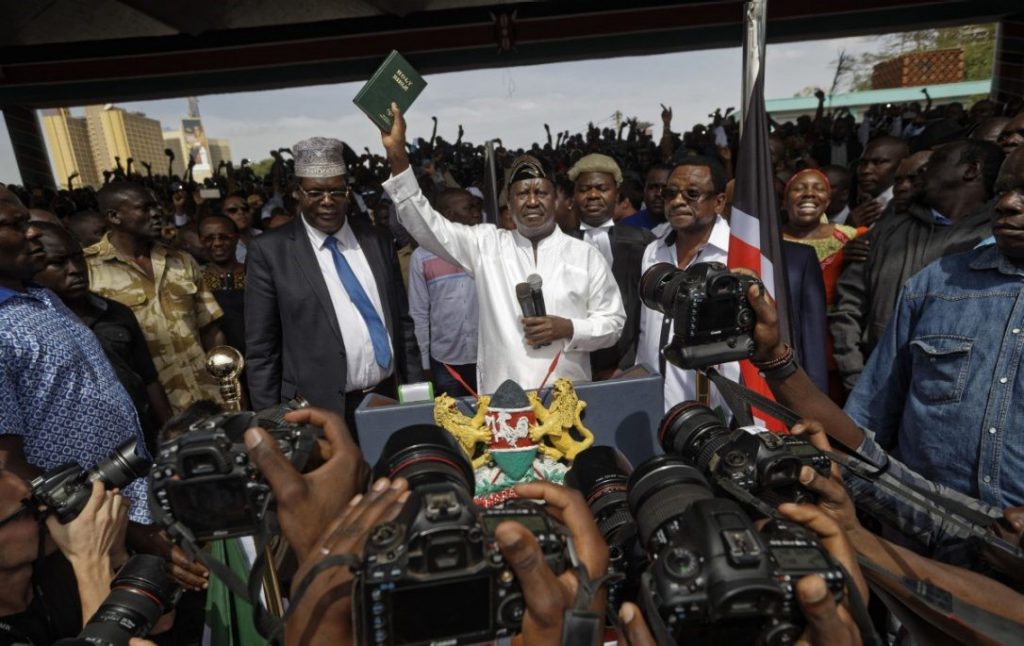Opposition Leader Raila Odinga Inaugurated as “People’s President”
Raila Odinga, Opposition Leader of Kenya’s National Super Alliance, recently held an inauguration ceremony for himself at Uhuru Park in central Nairobi. Before tens of thousands of supporters, Odinga swore himself in as the “People’s President” -– an apparent swipe at President Uhuru Kenyatta who won a second term in office despite last year’s highly disputed election results. Clad in traditional white garb, Odinga held a Bible in his right hand and swore an oath to defend the Constitution and to protect the sovereignty and dignity of the people of Kenya.
Many observers have voiced concerns that this demonstration could lead to widespread civil unrest in the country. According to Kenya’s National Commission on Human Rights, ninety-two people died during the violent protests that erupted last August following reports that the presidential election was rigged to favour the incumbent Kenyatta. In the midst of public outcry, Kenya’s Independent Election and Boundaries Commission (IEBC) investigated and ultimately referred the matter to the Supreme Court of Kenya. The Court determined that the election results consisted of “illegalities and irregularities” and voted unanimously to nullify the ballot.
In November, an election re-run was scheduled to take place. Unsettled by the IEBC’s failure to implement any meaningful reforms to the voting process, however, Odinga and the National Super Alliance boycotted the second election. As a result, President Kenyatta cruised to a second term with ninety-eight percent of the vote. Despite repeated promises by President Kenyatta to find common ground on contentious political issues and work towards national unity, Odinga and the National Super Alliance expressed their intent to form an alternative government. Last month, however, Githu Muigai, Kenya’s Attorney General, cautioned that any attempt to stage a mock inauguration would be regarded as treason.
While Muigai did not specifically address Opposition Leader Odinga or anyone from the National Super Alliance, he stated: “The swearing-in of any person not lawfully declared to have won an election by the Independent Election and Boundaries Commission, and the swearing-in is not conducted by the Chief Justice of the Republic of Kenya, is a process wholly unanticipated by the Constitution and is null and void and illegal”. A lawmaker with the National Super Alliance who stood next to Odinga in judicial dress was arrested recently, and was charged with unlawful assembly and consenting to the administration of an illegal oath. Further, prior to the mock inauguration, several of Kenya’s largest television networks were pulled off the air under orders from the Kenyatta administration.
Linus Kaikai, Chairman of Kenya Editors Guild, revealed that President Kenyatta threatened to shut down and revoke the media licenses of any network that aired the swearing-in of the “People’s President.”. Kaikai expressed concern that such a threat serves to undermine freedom of the press in Kenya and could impede the country’s path towards democracy. According to Fred Matiangi, Kenya’s Minister of the Interior, the television stations that aired Odinga’s mock inauguration are under investigation for their alleged attempt to “subvert and overthrow” Kenyatta’s government and will remain shut down. Matiangi suggested that the media’s participation in the mock inauguration could lead to political instability and the death of thousands of Kenyans.
Advocacy groups have expressed concern over the government’s shutdown of major television networks throughout Kenya. The U.S. State Department urged the Kenyatta administration to lift the media blackout and allow broadcasts to resume. However, the State Department also stated that it was “gravely concerned” about Odinga’s mock inauguration and affirmed their commitment to upholding the rule of law in Kenya. The European Union followed suit in urging Kenyans to respect the political process and recognize President Kenyatta as the nation’s one and only leader.
Thus far, interactions between supporters of Odinga, and the National Super Alliance, and those loyal to President Kenyatta have remained peaceful. However, In the weeks and months ahead, however, it is likely that the international community will be paying close attention to see if the situation becomes violent and old wounds are reopened in Kenya.
